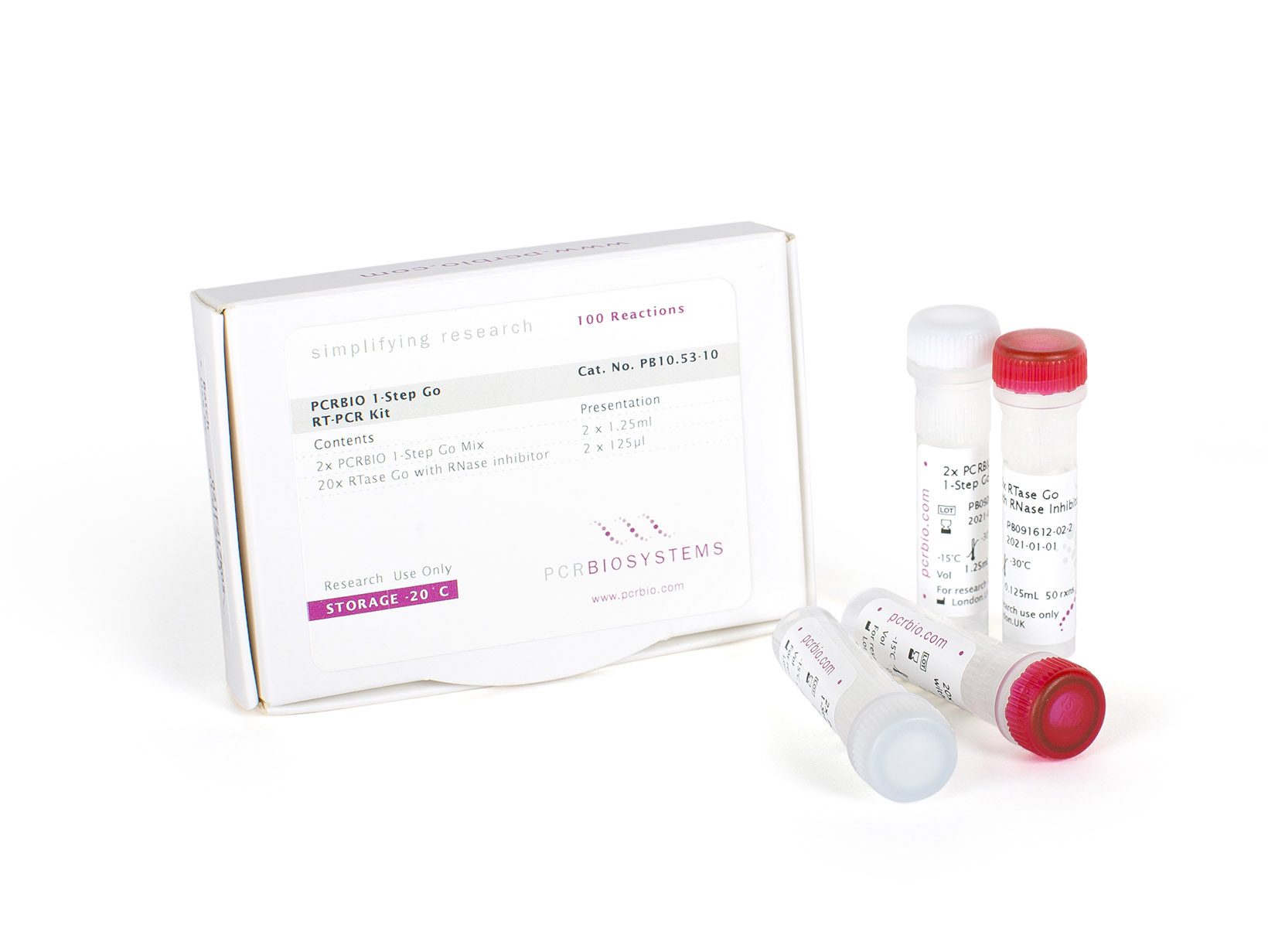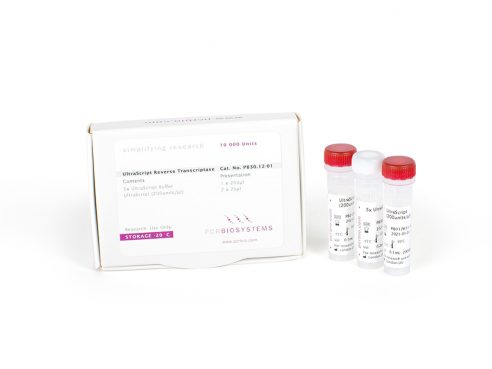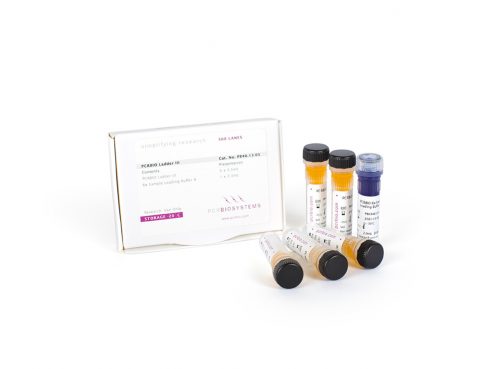To view your price please login or contact us
PCRBIO 1-Step Go RT-PCR Kit
PCRBIO 1-Step Go RT-PCR Kit is a convenient, easy-to-use kit for fast and efficient cDNA synthesis and PCR in a single tube.
The advanced buffer system, reverse transcriptase and hot start polymerase give highly specific and ultra-sensitive 1-step RT-PCR from any RNA template including mRNA, total RNA and viral RNA sequences.
Features
- Thermostable reverse transcriptase RTase Go
- Broad temperature range 45°C to 55°C
- Advanced RNase inhibitor
- Antibody-mediated hot start technology for unrivalled detection of low copy number templates
- High PCR yields under standard and fast PCR conditions
- Efficient specific amplification from complex templates including GC and AT-rich sequences
More Information
PCRBIO 1-Step Go RT-PCR Kit is a convenient, easy-to-use kit for fast and efficient cDNA synthesis and PCR in a single tube. The redesigned buffer system and modified reverse transcriptase offer enhanced yields and increased sensitivity compared to our original 1-step RT-PCR kit.
The kit combines our modified thermostable reverse transcriptase (RTase Go) with an advanced RNase inhibitor to enhance cDNA synthesis speed and yield. The PCR step is powered by PCRBIO HS Taq DNA Polymerase giving robust RT-PCR performance with minimal or no optimisation required. Our antibody-mediated hot start technology prevents the formation of primer dimers and non-specific amplification giving improved reaction sensitivity and specificity compared to other methods.
PCRBIO 1-Step Go RT-PCR Kit can be used with any RNA template including mRNA, total RNA and viral RNA sequences and gives reliable detection of even the most challenging targets.
Applications
- Gene expression analysis
- Transcription analysis
- Gene cloning
- Multiplex RT-PCR
Specifications
PCRBIO 1-Step Go RT-PCR Kit
Component
50 Reactions
100 Reactions
500 Reactions
20x RTase Go with RNase Inhibitor
1 x 125μL
2 x 125μL
10 x 125μL
2x PCRBIO 1-Step Go Mix
1 x 1.25mL
2 x 1.25mL
10 x 1.25mL
PCRBIO 1-Step Go RT-PCR Kit
Component
20x RTase Go with RNase Inhibitor
2x PCRBIO 1-Step Go Mix
50 Reactions
1 x 125μL
1 x 1.25mL
100 Reactions
2 x 125μL
2 x 1.25mL
500 Reactions
10 x 125μL
10 x 1.25mL
Reaction Volume
Storage
50μL
On arrival, products should be stored between -30 and -15°C. If stored correctly the kit will retain full activity for 12 months.
Reaction Volume
50μL
Storage
On arrival, products should be stored between -30 and -15°C. If stored correctly the kit will retain full activity for 12 months.
Documents
Product Manuals
Material Safety Data Sheets
Certificate of Analysis Finder
FAQs
Can I alter the activation time for the hot-start DNA polymerase?
We recommend using a minimum of 2 minutes for activating the polymerase. Longer times of up to 15 minutes can also be used with no detrimental effects to the enzyme.
Do I need 1-step or 2-step reaction?
1-step
Both the cDNA synthesis and PCR reactions occur in the same mix. This option is suited for high throughput applications due to its speed and ease of set up. There is also a reduced risk of contamination. It is not ideal for low quality RNA samples or if the cDNA is required for archive or separate analysis.
2-step
The cDNA synthesis and PCR reactions occur separately. This option is better suited if the cDNA product needs to be retained for analysis. It also allows for higher levels of reaction optimization. It permits control over the type and concentration of enzyme, RNA input and concentration of cDNA which, in turn, results in higher sensitivity compared to the 1-step format.
Do I need to use an RNase inhibitor in my RT reaction?
No, the RTase Go contains an RNase inhibitor to prevent any degradation and increase sensitivity.
General troubleshooting for low product/late Ct values:
If you are observing unusually late Ct values, try diluting the template RNA. By doing this, you are diluting any inhibitors which may be present to a concentration where they do not inhibit the reaction. Additionally, try increasing the reverse transcription step to 55 °C and increasing the annealing/extension temperatures. This may help resolve difficulties caused by secondary structures present in the RNA template and/or primers.
In cases where reaction inhibition may be involved, try reducing the amount of template1 or add 0.4 – 4.4 mg/ml BSA to the reaction2.
For more specific problems contact [email protected] with the following information:
Amplicon size
Reaction setup
Cycling conditions
Screen grabs of amplification traces and melting profile
1 Scipioni et al. A SYBR Green RT-PCR assay in single tube to detect human and bovine noroviruses and control for inhibition. Virology Journal.5:94 (2008). doi: 10.1186/1743-422X-5-94
2 Plante et al. The use of bovine serum albumin to improve the RT‐qPCR detection of foodborne viruses rinsed from vegetable surfaces. Applied Microbiology. 52:3 (2010) doi: https://doi.org/10.1111/j.1472-765X.2010.02989.x
Is mRNA isolation necessary for sensitive RT-PCR?
mRNA isolation is not normally required. PCRBIO 1-Step Go RT-PCR Kit has been developed to work on samples containing as little as 1 pg total RNA or 0.01 pg mRNA.
If you’re working with rare mRNA species, use a sequence-specific primer in the RT reaction to increase the sensitivity.
What priming method can I use?
Gene specific primers can be used in the 1-step reaction.
What size amplicons can I amplify?
PCRBIO 1-step Go RT-PCR Kit has been developed to amplify amplicons up to 3 kb in size from eukaryotic DNA.
What’s the difference between PCRBIO 1-Step Go RT-PCR Kit, qPCRBIO Probe 1-Step Go and qPCRBIO SyGreen 1-Step Detect|Go Kits?
The PCRBIO 1-step Go RT-PCR Kit has been developed for endpoint RT-PCR. The qPCRBIO Probe 1-Step Go and qPCRBIO SyGreen 1-Step Detect|Go are our probe- and dye-based options for real-time RT-PCR, respectively.
Will this work for micro RNA templates?
Yes, PCRBIO 1-Step Go RT-PCR Kit can be used for micro RNA templates. Although we do no sell dedicated kits, all of our RTases can be used for miRNA quantification and analysis.
We advise that you use one of the two following approaches:
- Use universal RT primers and add poly(A) or poly(U) tails (e.g. by poly(U)-polymerase), followed by cDNA synthesis using universal primers1,2.
- Use specific RT primers and omit the tailing step1,3-5.
If you are unfamiliar with the specifics of those approaches, please refer to the reference list below, which serve as a guideline.
1 Dave, V. P. et al. MicroRNA amplification and detection technologies: opportunities and challenges for point of care diagnostics. Lab Invest 99, 452-469, doi:10.1038/s41374-018-0143-3 (2019).
2 Mei, Q. et al. A facile and specific assay for quantifying microRNA by an optimized RT-qPCR approach. PLoS One 7, e46890, doi:10.1371/journal.pone.0046890 (2012).
3 Chen, C. et al. Real-time quantification of microRNAs by stem-loop RT-PCR. Nucleic Acids Res 33, e179, doi:10.1093/nar/gni178 (2005).
4 Raymond, C. K., Roberts, B. S., Garrett-Engele, P., Lim, L. P. & Johnson, J. M. Simple, quantitative primer-extension PCR assay for direct monitoring of microRNAs and short-interfering RNAs. RNA 11, 1737-1744, doi:10.1261/rna.2148705 (2005).
5 Androvic, P., Valihrach, L., Elling, J., Sjoback, R. & Kubista, M. Two-tailed RT-qPCR: a novel method for highly accurate miRNA quantification. Nucleic Acids Res 45, e144, doi:10.1093/nar/gkx588 (2017).
More Information
PCRBIO 1-Step Go RT-PCR Kit is a convenient, easy-to-use kit for fast and efficient cDNA synthesis and PCR in a single tube. The redesigned buffer system and modified reverse transcriptase offer enhanced yields and increased sensitivity compared to our original 1-step RT-PCR kit.
The kit combines our modified thermostable reverse transcriptase (RTase Go) with an advanced RNase inhibitor to enhance cDNA synthesis speed and yield. The PCR step is powered by PCRBIO HS Taq DNA Polymerase giving robust RT-PCR performance with minimal or no optimisation required. Our antibody-mediated hot start technology prevents the formation of primer dimers and non-specific amplification giving improved reaction sensitivity and specificity compared to other methods.
PCRBIO 1-Step Go RT-PCR Kit can be used with any RNA template including mRNA, total RNA and viral RNA sequences and gives reliable detection of even the most challenging targets.
Applications
- Gene expression analysis
- Transcription analysis
- Gene cloning
- Multiplex RT-PCR
Specifications
PCRBIO 1-Step Go RT-PCR Kit
Component
50 Reactions
100 Reactions
500 Reactions
20x RTase Go with RNase Inhibitor
1 x 125μL
2 x 125μL
10 x 125μL
2x PCRBIO 1-Step Go Mix
1 x 1.25mL
2 x 1.25mL
10 x 1.25mL
PCRBIO 1-Step Go RT-PCR Kit
Component
20x RTase Go with RNase Inhibitor
2x PCRBIO 1-Step Go Mix
50 Reactions
1 x 125μL
1 x 1.25mL
100 Reactions
2 x 125μL
2 x 1.25mL
500 Reactions
10 x 125μL
10 x 1.25mL
Reaction Volume
Storage
50μL
On arrival, products should be stored between -30 and -15°C. If stored correctly the kit will retain full activity for 12 months.
Reaction Volume
50μL
Storage
On arrival, products should be stored between -30 and -15°C. If stored correctly the kit will retain full activity for 12 months.
Documents
Product Manuals
Material Safety Data Sheets
Certificate of Analysis Finder
FAQs
Can I alter the activation time for the hot-start DNA polymerase?
We recommend using a minimum of 2 minutes for activating the polymerase. Longer times of up to 15 minutes can also be used with no detrimental effects to the enzyme.
Do I need 1-step or 2-step reaction?
1-step
Both the cDNA synthesis and PCR reactions occur in the same mix. This option is suited for high throughput applications due to its speed and ease of set up. There is also a reduced risk of contamination. It is not ideal for low quality RNA samples or if the cDNA is required for archive or separate analysis.
2-step
The cDNA synthesis and PCR reactions occur separately. This option is better suited if the cDNA product needs to be retained for analysis. It also allows for higher levels of reaction optimization. It permits control over the type and concentration of enzyme, RNA input and concentration of cDNA which, in turn, results in higher sensitivity compared to the 1-step format.
Do I need to use an RNase inhibitor in my RT reaction?
No, the RTase Go contains an RNase inhibitor to prevent any degradation and increase sensitivity.
General troubleshooting for low product/late Ct values:
If you are observing unusually late Ct values, try diluting the template RNA. By doing this, you are diluting any inhibitors which may be present to a concentration where they do not inhibit the reaction. Additionally, try increasing the reverse transcription step to 55 °C and increasing the annealing/extension temperatures. This may help resolve difficulties caused by secondary structures present in the RNA template and/or primers.
In cases where reaction inhibition may be involved, try reducing the amount of template1 or add 0.4 – 4.4 mg/ml BSA to the reaction2.
For more specific problems contact [email protected] with the following information:
Amplicon size
Reaction setup
Cycling conditions
Screen grabs of amplification traces and melting profile
1 Scipioni et al. A SYBR Green RT-PCR assay in single tube to detect human and bovine noroviruses and control for inhibition. Virology Journal.5:94 (2008). doi: 10.1186/1743-422X-5-94
2 Plante et al. The use of bovine serum albumin to improve the RT‐qPCR detection of foodborne viruses rinsed from vegetable surfaces. Applied Microbiology. 52:3 (2010) doi: https://doi.org/10.1111/j.1472-765X.2010.02989.x
Is mRNA isolation necessary for sensitive RT-PCR?
mRNA isolation is not normally required. PCRBIO 1-Step Go RT-PCR Kit has been developed to work on samples containing as little as 1 pg total RNA or 0.01 pg mRNA.
If you’re working with rare mRNA species, use a sequence-specific primer in the RT reaction to increase the sensitivity.
What priming method can I use?
Gene specific primers can be used in the 1-step reaction.
What size amplicons can I amplify?
PCRBIO 1-step Go RT-PCR Kit has been developed to amplify amplicons up to 3 kb in size from eukaryotic DNA.
What’s the difference between PCRBIO 1-Step Go RT-PCR Kit, qPCRBIO Probe 1-Step Go and qPCRBIO SyGreen 1-Step Detect|Go Kits?
The PCRBIO 1-step Go RT-PCR Kit has been developed for endpoint RT-PCR. The qPCRBIO Probe 1-Step Go and qPCRBIO SyGreen 1-Step Detect|Go are our probe- and dye-based options for real-time RT-PCR, respectively.
Will this work for micro RNA templates?
Yes, PCRBIO 1-Step Go RT-PCR Kit can be used for micro RNA templates. Although we do no sell dedicated kits, all of our RTases can be used for miRNA quantification and analysis.
We advise that you use one of the two following approaches:
- Use universal RT primers and add poly(A) or poly(U) tails (e.g. by poly(U)-polymerase), followed by cDNA synthesis using universal primers1,2.
- Use specific RT primers and omit the tailing step1,3-5.
If you are unfamiliar with the specifics of those approaches, please refer to the reference list below, which serve as a guideline.
1 Dave, V. P. et al. MicroRNA amplification and detection technologies: opportunities and challenges for point of care diagnostics. Lab Invest 99, 452-469, doi:10.1038/s41374-018-0143-3 (2019).
2 Mei, Q. et al. A facile and specific assay for quantifying microRNA by an optimized RT-qPCR approach. PLoS One 7, e46890, doi:10.1371/journal.pone.0046890 (2012).
3 Chen, C. et al. Real-time quantification of microRNAs by stem-loop RT-PCR. Nucleic Acids Res 33, e179, doi:10.1093/nar/gni178 (2005).
4 Raymond, C. K., Roberts, B. S., Garrett-Engele, P., Lim, L. P. & Johnson, J. M. Simple, quantitative primer-extension PCR assay for direct monitoring of microRNAs and short-interfering RNAs. RNA 11, 1737-1744, doi:10.1261/rna.2148705 (2005).
5 Androvic, P., Valihrach, L., Elling, J., Sjoback, R. & Kubista, M. Two-tailed RT-qPCR: a novel method for highly accurate miRNA quantification. Nucleic Acids Res 45, e144, doi:10.1093/nar/gkx588 (2017).









